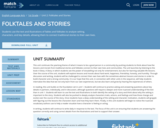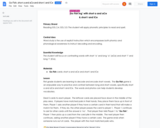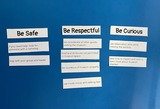
English Instructional Plan – Context Clues: Grade 3
- Subject:
- English
- Reading
- Material Type:
- Lesson Plan
- Author:
- VDOE Project Team
- Date Added:
- 04/13/2022

English Instructional Plan – Context Clues: Grade 3

Contractions Worksheet; can be used as small group, whole group or independent station work. Directions: Complete the missing part of each contraction equation.

This unit continues the yearlong theme of what it means to be a good person in a community by pushing students to think about how the lessons and morals from traditional stories and folktales connect to their own lives and communities. The unit launches by listening to the book A Story, A Story, in which students see the power of storytelling not only for entertainment, but also for learning valuable life lessons. Over the course of the unit, students will explore lessons and morals about hard work, happiness, friendship, honesty, and humility. Through discussion and writing, students will be challenged to connect their own lives with the sometimes-abstract lessons and stories in order to build character and a strong community. It is our hope that this unit, in connection with other units in the sequence, will help students internalize the idea that we not only learn from our own experiences, but we also learn and grow by hearing the experiences of others.
In reading, this unit builds on the foundation set in unit 1. Students will continue to practice asking and answering questions about key details in partners, individually, and in discussion, although questions will require a deeper and more nuanced understanding of the text than in unit 1. Students will learn to use the text and illustrations to both identify the setting of a story and think about why the setting is important to the story. Students will also be pushed to deeply analyze characters traits, actions, and feelings and how those change and evolve over the course of the story. Once students have a deep understanding of the setting and character motivation, students will grapple with figuring out the lessons the characters learn and how they learn them. Finally, in this unit students will begin to notice the nuanced vocabulary authors use to help a reader visualize how a character is feeling or acting.
In writing, students will continue to write daily in response to the text. The focus of this unit is on ensuring that students are answering the question correctly and using correct details from the illustrations and text to support their answer.

Word study is the use of explicit instruction which encompasses both phonics and phonological awareness to instruct decoding and encoding. Third grade students are learning to decode and encode short vowels. The Go Fish game is an enjoyable way to practice and contrast between long and short vowels, specifically short a and aCe and short I and iCe. The words and photos can help students develop vocabulary.

This lesson reviews citizenship expectations as students effectively communicate in small groups and the whole-class setting to prepare for a trip to the Science Museum! Students analyze and sort behaviors into categories, based on the attributes or actions described while reviewing vocabulary critical to a museum visit. Special thanks to the Science Museum of Western Virginia and the Center for Educational Networks and Impacts at Virginia Tech for their advisement and resource contribution to this lesson.

English Instructional Plan- Using Text Features in Nonfiction